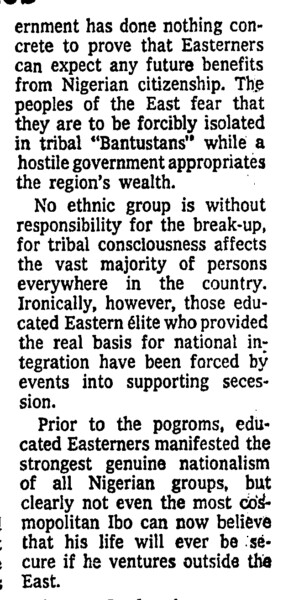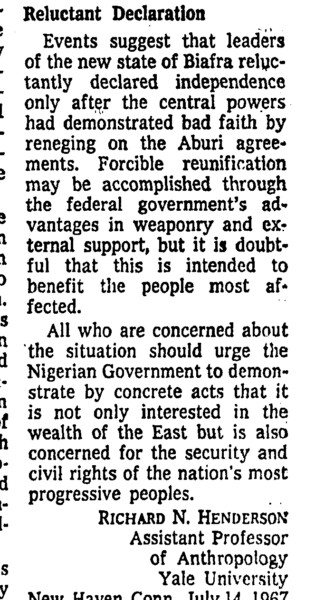The process of disintegration and eventual collapse of the “New Nation” of Nigeria was visibly underway when Helen and I left Nigeria in mid-1962. The pioneering study by political scientist James Coleman’s (1958) Nigeria: Background to Nationalism had set the stage clearly , and Richard Sklar’s (1963) Nigerian Political Parties had exposed the starkness and depth of the oppositions among the three main political groups. Clifford Geertz’s essay on the subject concluded that Nigeria’s political system had a “very tentative” quality to it (not exactly an endorsement of its stability prospects).1. The coup and counter-coup of 1966 and 67 shockingly confirmed what many social scientists were expecting.
I was tracking it in the early years of my professorial duties at Yale (1963-72, so we experienced the entire duration of the Civil War (through its catastrophic end) while living in New Haven, Connecticut.
I amassed a large body of documentary materials during that time,which some Yale graduate students who had become engrossed with the conflict borrowed for research purposes — and proceeded to lose in a fire at their off-campus house (that was what I was told, anyway. I didn’t check out the embers). In any case, this ended my research project — afterward I became caught up in more pressing matters.
The entire duration of the Biafra War was heartbreaking for us. We had Igbo-speaking students around us at the beginning of the conflict (who eventually graduated to elsewhere,then being succeeded by Hausa-speakers in their place). During the war, we organized a number of activities protesting American policy toward the emerging Biafra — a grand seminar on the topic and the Biafran Children’s Relief Fund (a non-profit group run mainly by Helen Henderson and Ann Scheffler that raised money sent to the Catholic and Anglican relief projects of that time). We held a protest against the U.S. government’s support of Nigeria when then-Secretary of State Dean Rusk visited campus. All of these efforts failed completely (Yale was largely uninterested in the conflict), except for our BCRF efforts, which drew serious support from those informed about the situation (and for which we were deservedly grateful).
At the outset of the war I sent this letter to the New York Times editorial page (July 31, 1967)



Allow me to make a brief aside comment here. Not long before he died, the deservedly-respected expert on many facets of “Igbo studies”, Professor A. D. Afigbo, labeled me in print as one of the “enemies of the Igbo Nation.” Granting that he said this in light of some of my historical inferences in The King in Everyman (1972) –where I correctly regarded precolonial Ndi-Igbo as not a politically self-conscious unity –, this politically-motivated canard cannot be allowed to stand without some measure of rebuke. He was obviously ignorant of my stance at the outset of the Biafra civil war (and afterward). I forgive him for his un-historian comments regarding his postulated ancient “Igbo Nation”, but I hope others who have read his work on this topic will read the above text before making ill-informed assumptions based on Professor Afigbo’s later political efforts to revive Biafra When he made these comments, he was expressing a political opinion, definitely not a thoughtful historical assessment.
In setting out to create this page (now many years ago), I planned to re-present the many aspects of what happened during those war years and afterward, but have been unable to do so. I feel no need to apologize — too many other events took over my life for too many years. (If there are any ways in which I have been very lucky, one way has been in exuberant richness of distractions.) I do think readers will appreciate following some of the work of Victor Manfredi, including his essay on Nigeria as a failed state; see the reference here below:
Manfredi, Victor, 2013, “A recurrence of structures in collapsing Nigeria”, in Felicity Aulino, et al, eds, Radical Egalitarianism: Local Realities, Global Relations.
.
- Geertz, Clifford, in Clifford Geertz, ed,, Old Societies and New States.. pp. 105–157. [↩]